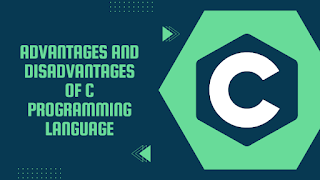Advantages And Disadvantages of C Programming Language
There's no doubt of the truth that higher-level programming languages such as Python, R, and Java have the distinction as the top three most loved and widely utilized, high-scalability programming languages over the last decade. However, this doesn't diminish the strength, power and influence that C- is one of the most enduring programs, C- that forms the foundation and basis of nearly every database, machine, and compiler available on the marketplace.
Note: If you are a student and enhnace you knowledge of the C Programming, then you can get help from our experts C Programming Help.
What exactly is C language?
General-purpose and procedural medium-level, or middle-language (as it can support high-level and low-level functions) which was initially invented by Dennis M. Ritchie to promote an UNIX operating system developed at Bell Labs, C was initially implemented using the DEC PDP-11 PC in the year 1972.
The programs that compose an operating system is the ones that C programming was originally used to create. The code created in C is as fast as assembly language code and was then used as a system development language.
Examples of the use of C language are: Operating Systems (UNIX Operating system and all UNIX applications), Language Compilers (C Compiler) Assemblers Text Editors and Spoolers for Print Spoolers and network Drivers, Modern Programs, Databases, Language Interpreters, and Utilities.
Note: If you are a student and enhnace you knowledge of the Arduino, then you can get help from our experts Arduino Assignment Help.
What are the benefits from C language?
C is a highly regarded language all over the world. It is perfect for programmer to master at the start in their careers. There isn't much vocabulary to be learned The syntax is straightforward it is considered a modular language, which makes it simpler to master.
1. It is simple to grasp
One of the major reasons for people to choose C instead of different programming languages is due to its ease of use. C is an extremely versatile language, as programs written within it are quick and efficient. This allows you to learn C simpler than another programming language. It is simple to comprehend the basic concepts of C since there aren't a lot of terms or symbols that are involved. Furthermore it is not necessary to be an knowledgeable about computer science to start using C programming. All you need to do is look through some online tutorials and then begin writing your own code. Additionally, there are user-defined and system-generated functions that can be found in C Language.
2. The presence of libraries in a variety
C Language provides lots of built-in functions, which include functions that are generated by the system and functions that are defined by users. Many general functions can be used to develop a program, while the programmer can also create a function as per their requirements, which is called a user-generated/defined function, in C Compiler.
3. Easy to write
Another reason C is so well-liked as a language that is efficient for programmers is that it permits developers to write programs of their own without worrying about syntax mistakes. If you're unfamiliar with programming, then the structured language C can help you acquire more proficiency. With C you'll be creating more efficient and efficient solutions than those developed with other languages of programming.
Note: If you are a student and enhnace you knowledge of the Artificial Intelligence, then you can get help from our experts Artificial Intelligence Assignment Help.
What are the negatives in C language?
1. Lack of Object Orientation
C is a vast and powerful language, and it uses the procedural programming method. It does not extend its support for the notion of OOPs (Inheritance polymorphism, Abstraction, Encapsulation and Information Hiding). This means that you cannot make a class with multiple inheritances such as Java, Python, or C++. In OOP languages such as Java it is possible to take methods that were created by the class we are inheriting from. However, there is no similarity to C. C language. We are not able to create subclasses of our classes. Therefore, it is difficult to reuse existing code.
2. Inefficient Memory Management
When using C Language you don't need any techniques for managing memory since it manages the resources allocated to you. If you wish to make use of dynamic allocation, then you must allocate dynamically using the malloc function. If you manually allocate this you'll receive a segmentation fault. Therefore, we should always be aware the importance of Memory Management Techniques.
Note: If you are a student and enhnace you knowledge of the SPSS, then you can get help from our experts SPSS Assignment Help.
3. No Garbage Collection
Garbage collection is a function that automatically retrieves memory from objects that are not required by a library or application. It is a tool to perform manual and automatic garbage collection. Automatic garbage collection happens when there isn't enough free space in the heap to allocate new objects. This can happen because all the available physical RAM was assigned to other processes that are running within the system. Manual garbage collection is the process of explicitly clearing memory blocks that are not being used by calling functions like malloc.

Comments
Post a Comment